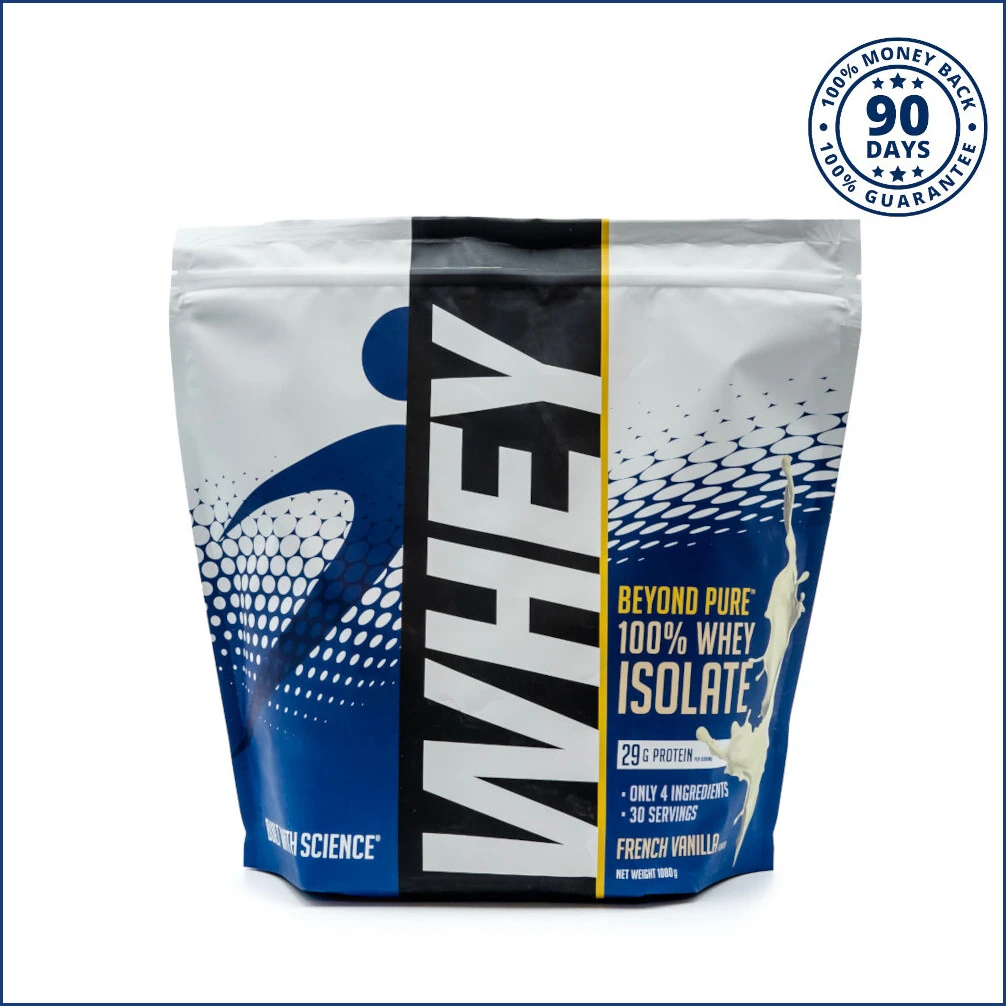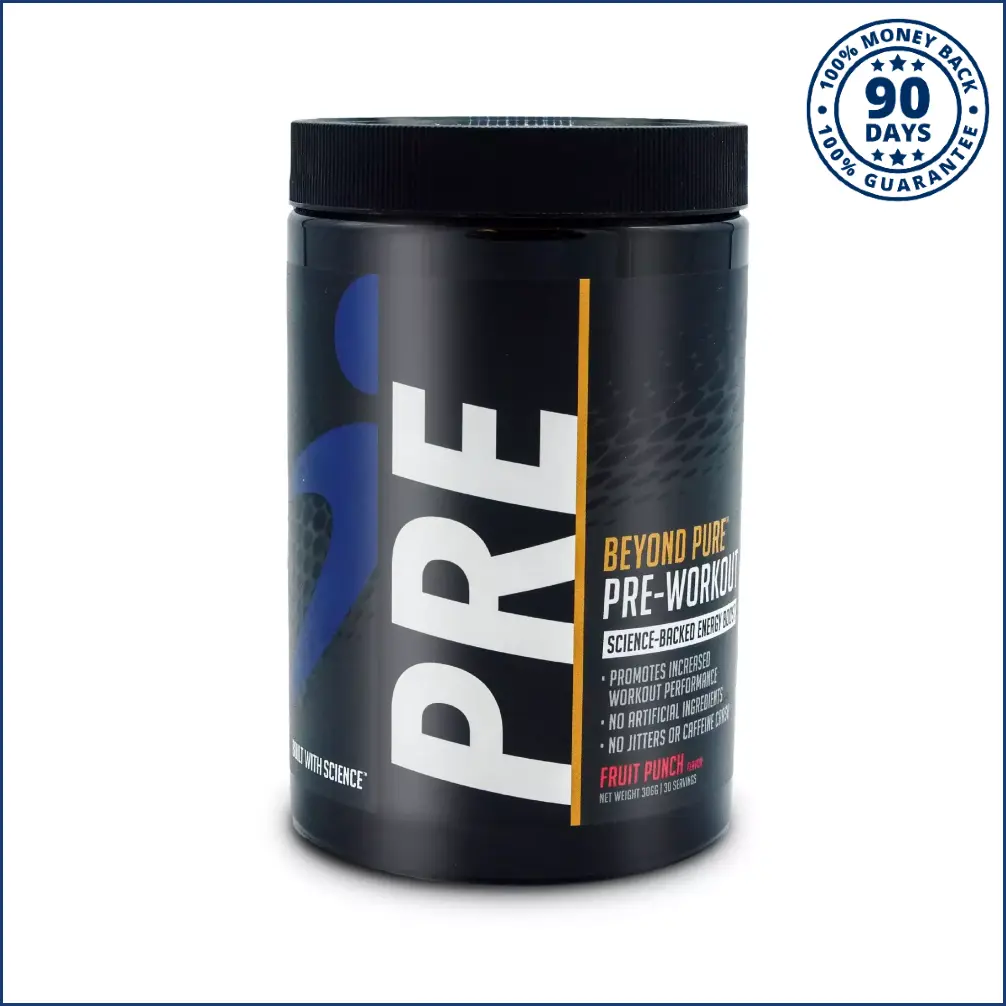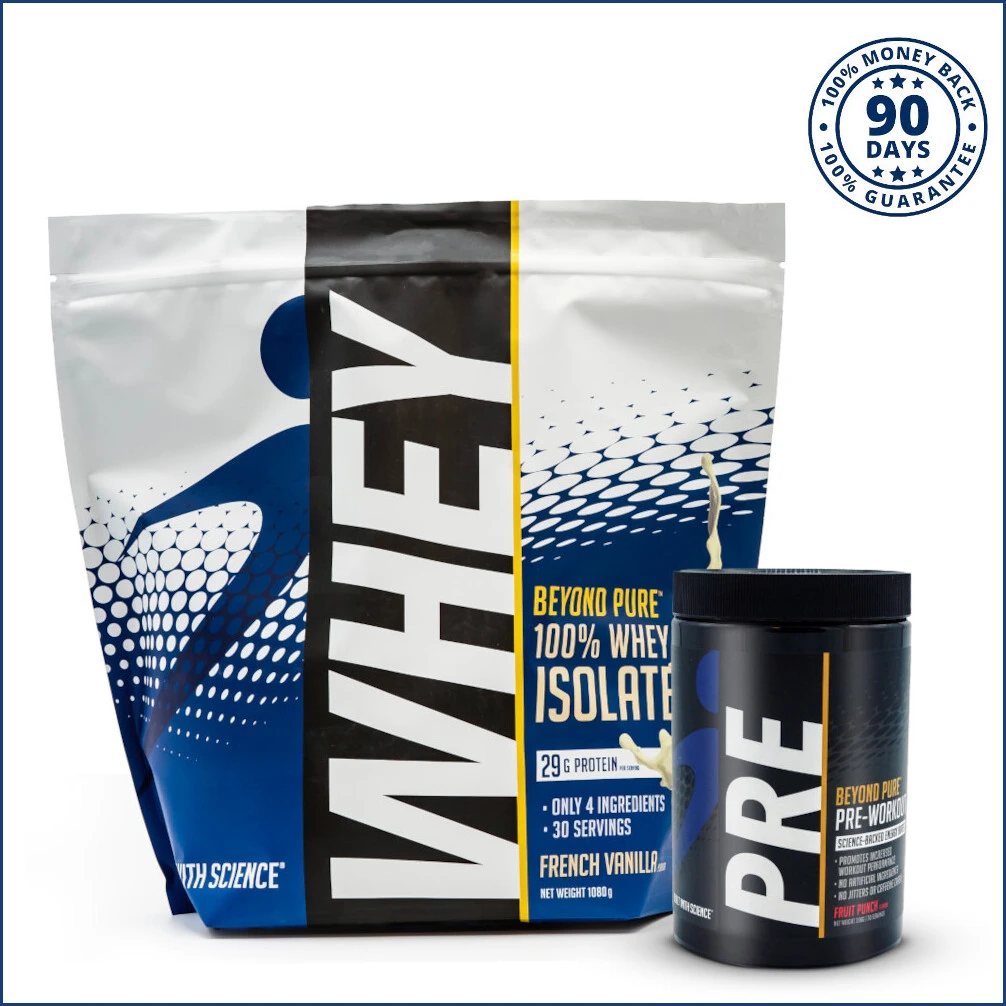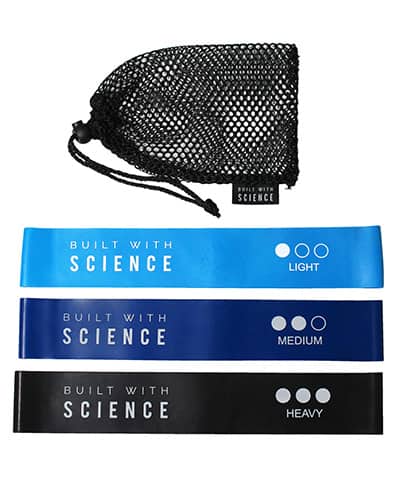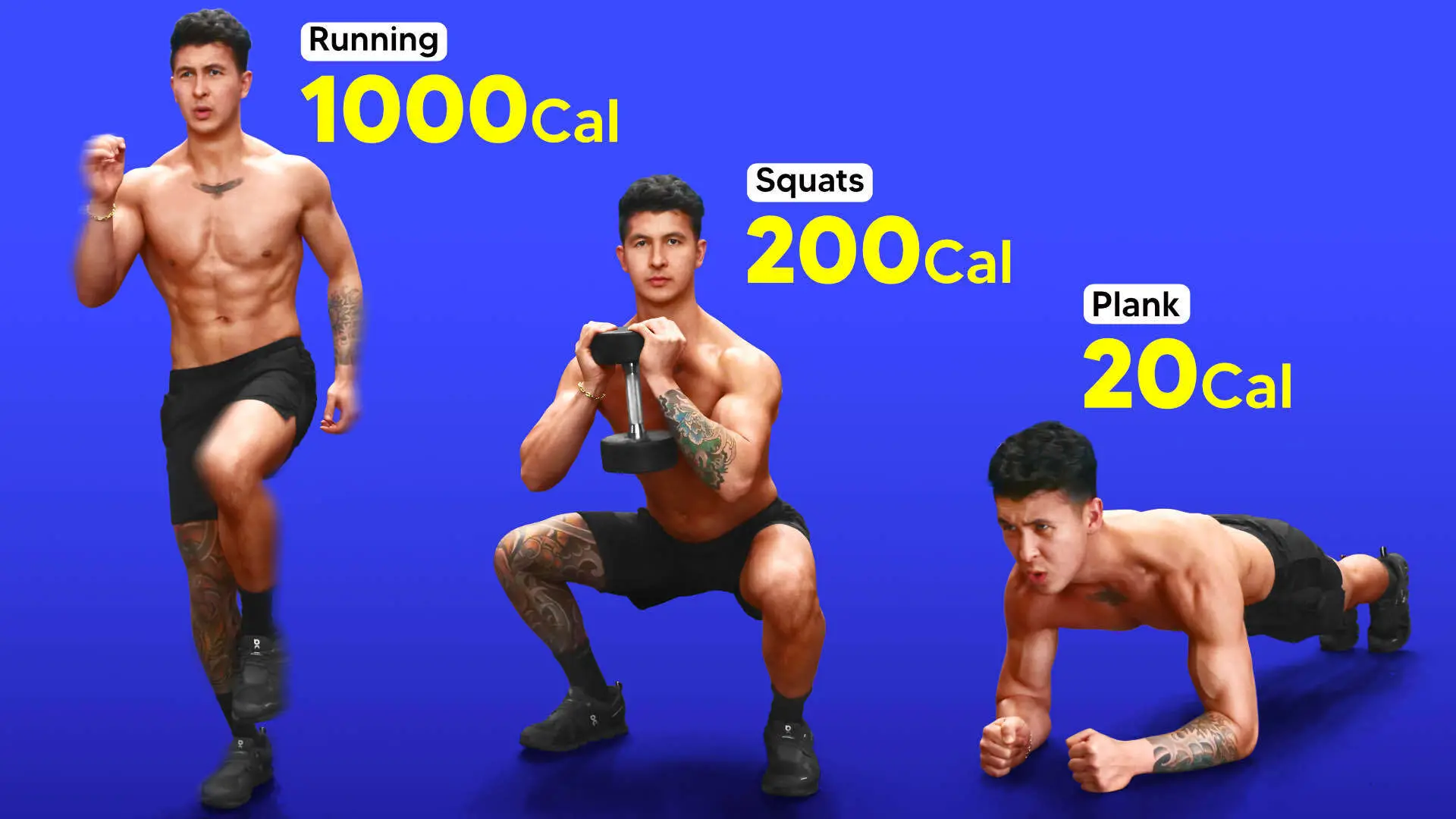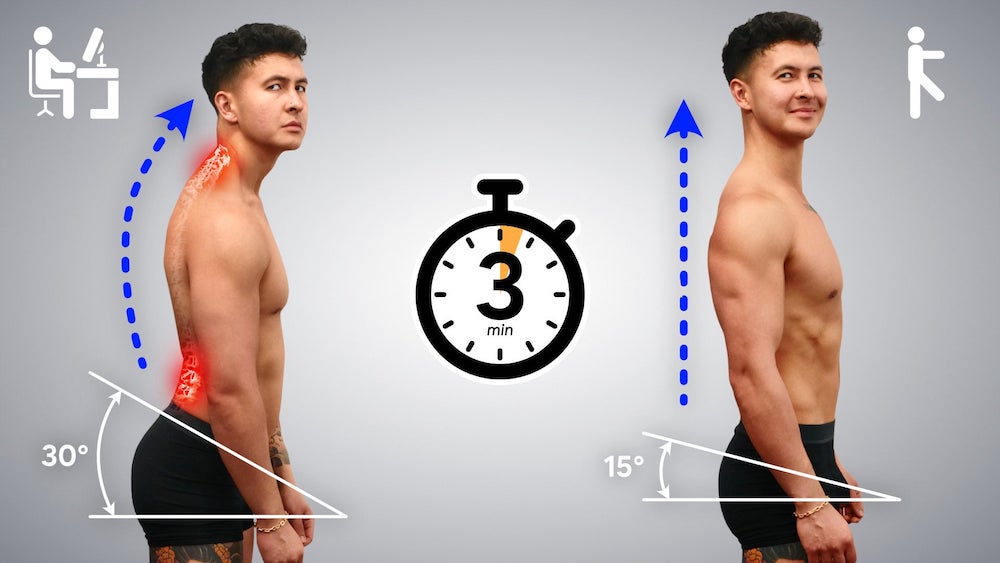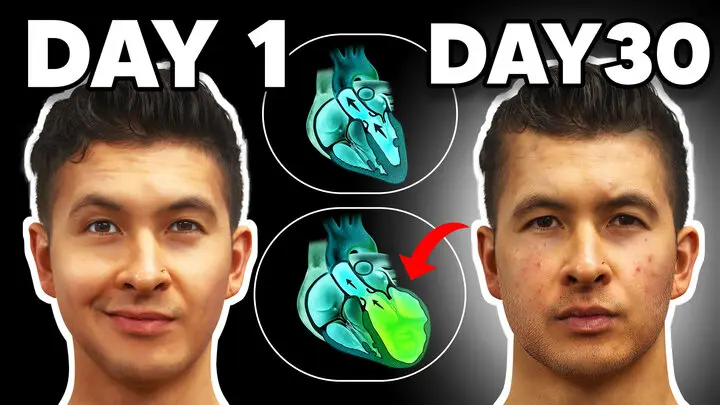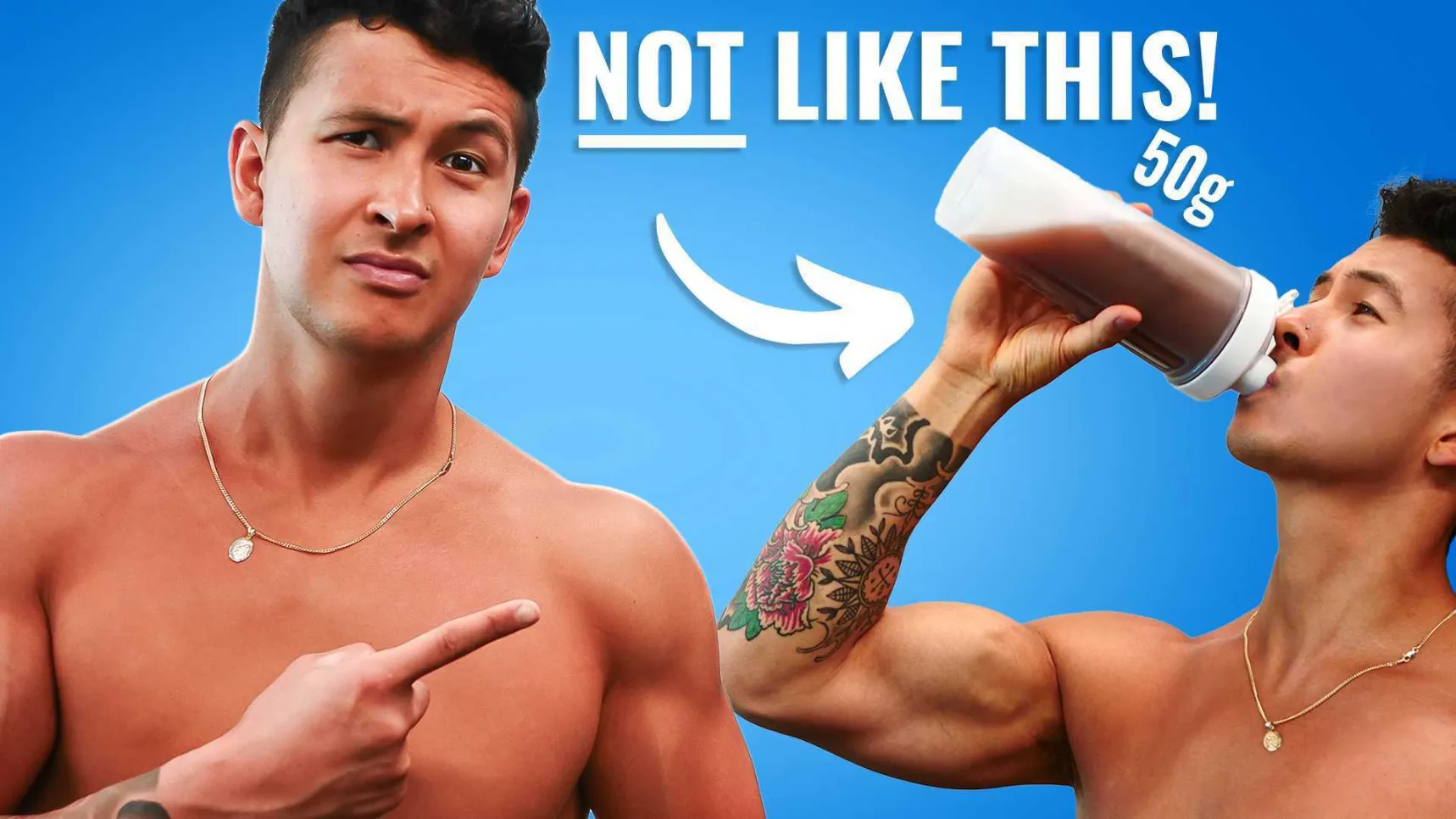
The BEST Way To Use Protein For Muscle Gain (Updated Research And Science 2023)
Because using protein for muscle gain is not just as simple as slamming a protein shake after every workout.
Primary researcher for this article: Daniel Plotkin, PhD student
Protein is hands down the most important food to build muscle.
But, as mentioned, to maximize its benefits, there’s a lot more that goes into it than just slamming a protein shake after every workout.
Today, we’ll discuss the latest science on how you can best use protein for muscle gain, including:
- The best types of protein for muscle growth
- How much protein you really need to eat a day, and
- How exactly to eat it to maximize growth
What's The Best Protein For Muscle Gain?
Let’s start with protein type.
Factors Affecting A Protein's Effectiveness For Muscle Growth
So there are two factors scientists use to rank the effectiveness of a protein for muscle gain:
- Digestibility: A higher score here means more of that protein can be actually broken down and used to build muscle.
- Amino acids profile: Every protein source contains a variety of different amino acids, which are the building blocks of protein. There are 20 in total, but 9 of those can't be produced by the body and are defined as essential. These 9 essential amino acids are thus the most important for building muscle.
So what protein sources have the highest digestibility and the highest essential amino acid content?
Well, it’s typically the protein sources you’d expect:
- Protein powder
- Meat
- Fish
- Dairy products
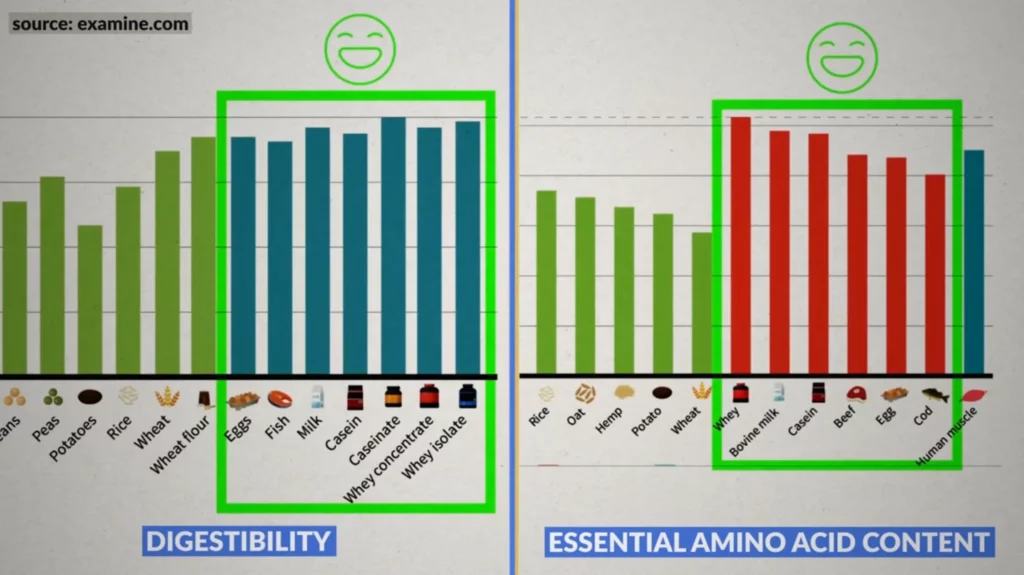
Human muscle also scores pretty high, but don’t get any weird ideas.
Plant-based protein doesn’t score very well, but we’ll talk about what that means later on.
But There May Be More To The Picture
Now, there is some new research suggesting that there may be more to evaluating the effectiveness of a protein for muscle gain than just digestibility and amino acid content.
Back in 2017, a study had subjects eat either 18 grams of protein from whole eggs or 18 grams of protein from egg whites after a workout. They then analyzed their muscle protein synthesis response, which you can think of basically as a signal to your muscles to recover and grow bigger.
Generally, you’d expect it to be the same, given the equal protein content.
To everyone’s surprise, the whole eggs led to a significantly higher muscle protein synthesis response (0.07% to 0.13% after eating whole eggs vs 0.07% to 0.086% after eating egg whites).
But the real question is, would this increase actually lead to more muscle growth?
Well, a few years after this study came out, another group of researchers aimed to answer that question. They randomly assigned participants to 2 groups. Both groups ate the same amount of total calories and protein throughout the day, with the only difference being:
- 1 group ate 20 grams of protein from 3 whole eggs after every workout, whereas
- The other group ate the same amount of protein but from 6 egg whites instead
After 12 weeks, the whole-egg group increased their quadriceps strength and reduced their body fat % to a significantly greater extent than the egg-white group.
There was also a strong trend towards a greater increase in lean body mass in the whole egg group.
Although it’s unclear what made whole eggs superior, it may be linked to their cholesterol content and possibly some additional nutrients contained within the yolk.
Now, I’m not saying to eat a diet exclusively of eggs based on this preliminary evidence, but it just goes to show that there may be some unique muscle-building properties within protein sources that we are not yet aware of, and I’ll keep you guys updated with any new research.
What To Know About Using Plant-Based Protein For Muscle Gain
And lastly, what about using plant-based protein for muscle gain? Surely, doing so will be less effective than using animal-based protein sources for building muscle, right?
Well, the answer might surprise you.
Remember how the plant-based protein sources ranked relatively poorly when it comes to digestibility and essential amino acid content?
Because of this, they tend to result in a lower protein synthesis response when compared to animal-based sources.
But protein synthesis doesn’t always correlate well with changes in muscle growth.
This led researchers in a 2021 study to investigate further by comparing the effects of a vegan diet versus a primarily animal-based diet over the course of a 12-week training program.
The vegan group supplemented with soy protein and also made an effort to vary their protein sources throughout the day to make sure they weren’t deficient in any particular essential amino acid.
Surprisingly, both diets led to similar increases in both muscle size and strength.
And this same result was shown in a similar study published just this year.
However, researchers highlighted the outcome was likely heavily dependent on two things:
- Eating enough daily protein, and
- Properly spreading out that protein throughout the day
Both are what we’ll cover next.
How Much Protein For Muscle Gain
Eat too little, and you won’t maximize your growth. But eating too much protein for muscle gain has its downsides as well (e.g., little space left for other macronutrients).
What’s the sweet spot?
Well, it depends.
The best piece of evidence we have so far for optimal daily protein intake for muscle growth is a 2018 meta-analysis. In it, the researchers analyzed the effect of protein intake on muscle growth across 49 studies.
They found that adding more protein to one’s diet significantly increased muscle mass on average by about 0.66 lbs over the length of the studies.
However, although more protein did lead to more growth, this was only true up to a point.
In this case, protein intakes above 0.73 g/lb of body weight per day failed to help build any additional muscle.
For the average 180lb individual person, this would come up to around 130 grams of protein per day.
And remember, this is to maximize growth. Even if you’re below this, you’ll definitely still be able to build muscle, so don’t get discouraged if you’re unable to hit that target.
That said, in all of the studies analyzed, subjects were eating at either maintenance calories or in a surplus.
What About Protein For Muscle Gain In A Calorie Deficit?
This is when the body is more likely to burn off muscle for energy and is when an even higher protein intake could help prevent this.
Well, unfortunately, we don't yet have a study comparing protein intakes that are both higher during a calorie deficit, such as 0.8g/lb BW vs 1.2g/lb BW.
There is some speculative evidence suggesting that the leaner you get and/or the more aggressive your diet is, the higher your protein intake should be to prevent muscle loss.
But again, it’s relatively unclear.
Daily Protein Intake For Muscle Growth Recommendations
So I’d recommend if you’re maintaining or eating in a surplus, to maximize growth, aim for a minimum of 0.73g/lb of body weight per day.
Higher than this is also fine and may have other benefits like helping with hunger, but I generally wouldn’t go above 1.2 g/lb of body weight since, at that point, those additional calories may be better used towards carbs to help fuel your performance and energy in the gym.
Whereas when you’re in a deficit, there’s no harm in being extra cautious and bumping up your minimum protein intake to 1g/lb a day, especially if you’re relatively lean (under 15% body fat for men and under 25% body fat for women).
However, these protein recommendations are based on your total body weight.
If 2 people weigh the same, yet one has significantly less muscle and more fat, then that individual won’t need as much protein.
So if your body fat is higher than around 30% for males and around 40% for females, instead of using my grams per lb recommendation, you can take your height in cm and simply eat that amount of protein in grams per day.
Budget-Friendly Protein Sources
Ok, so before we move on to how to eat your daily protein for muscle gain, let’s talk about the actual cost of eating enough protein.
While it can be pricey, there are ways around that.
In my latest budget meal plan article, I found the cheapest protein sources possible and ranked them based on their cost per gram of protein.
Here’s the list.
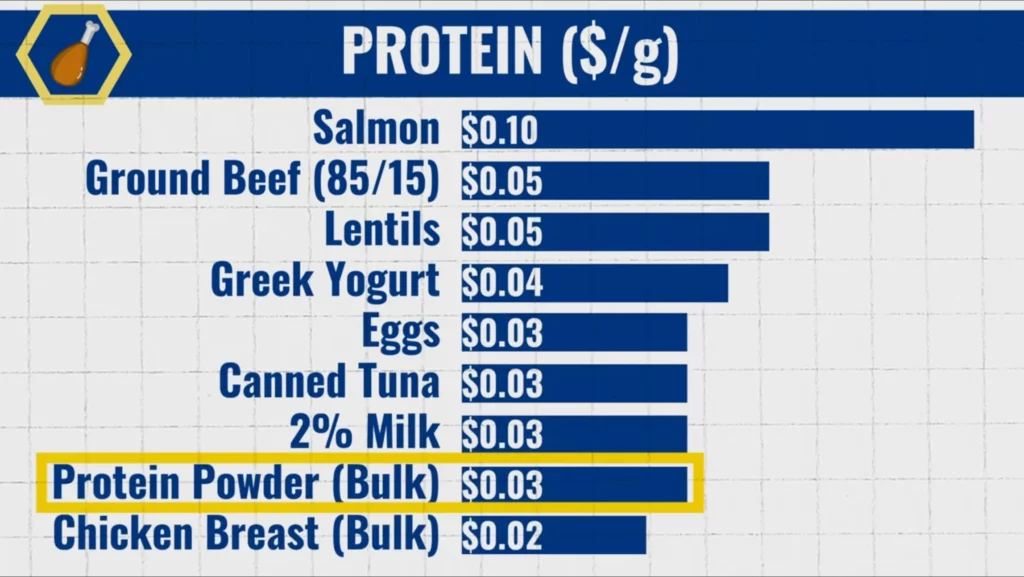
A special note on protein powder. Despite its rising costs, if you buy in bulk and calculate the cost per gram of protein, it comes out cheaper than ground beef and Greek yogurt and actually ends up around the same price as eggs, milk, and canned tuna.
Not to mention it tastes great, it’s convenient, and it doesn’t come with a ton of extra fat and calories like other protein sources do.
Now, I do sell my own protein powder, BWS Isolate Whey Protein Powder, which is a little more pricey, but it is the highest quality protein and packs 29 whopping grams of protein per scoop.
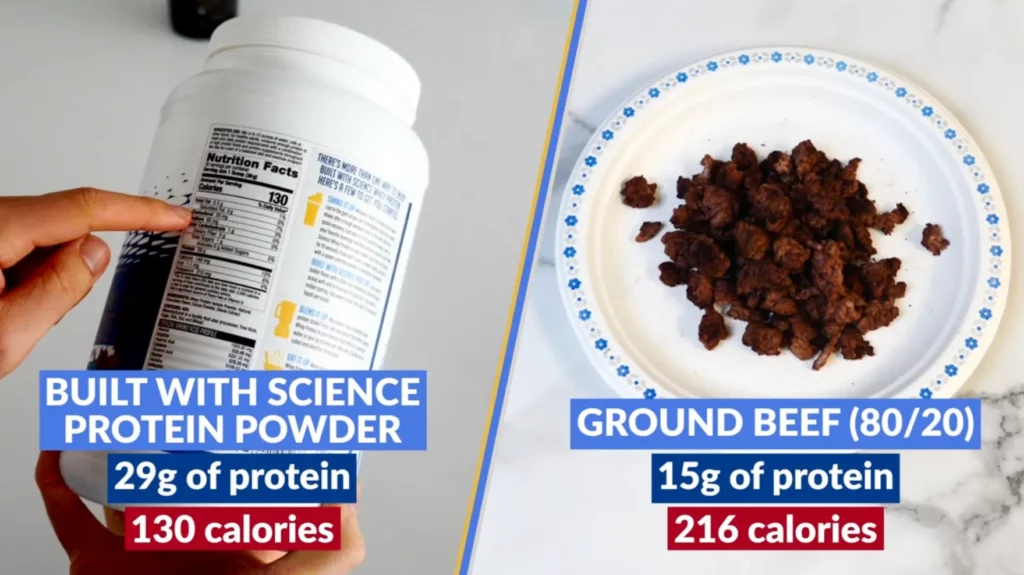
Whether you get it or not doesn’t matter to me, just definitely consider investing in protein, as it’ll make hitting your daily protein intake so much easier.
How To Eat (Distribute) Your Daily Protein For Muscle Gain
Alright, so you know how much protein for muscle gain you should eat per day. But if you want to truly maximize the growth you get from that protein, then how exactly you eat that protein throughout the day also matters.
You see, every time you consume protein, your muscle protein synthesis levels increase, which, as you now know, is basically a signal for your muscles to grow.
However, you can only increase your muscle protein synthesis levels up to a point.
It seems like around 20-30 grams of protein maxes this out. In addition to this, after this increase, there is some evidence that you won’t be able to restimulate it again for at least a couple of hours.
This is where the distribution of protein for muscle gain comes into play.
Space Out Your Intake Of Protein For Muscle Gain
Theoretically, if you space out your protein evenly throughout the day, you’ll be able to keep your muscle protein synthesis levels elevated and provide a consistent signal for your muscles to grow.
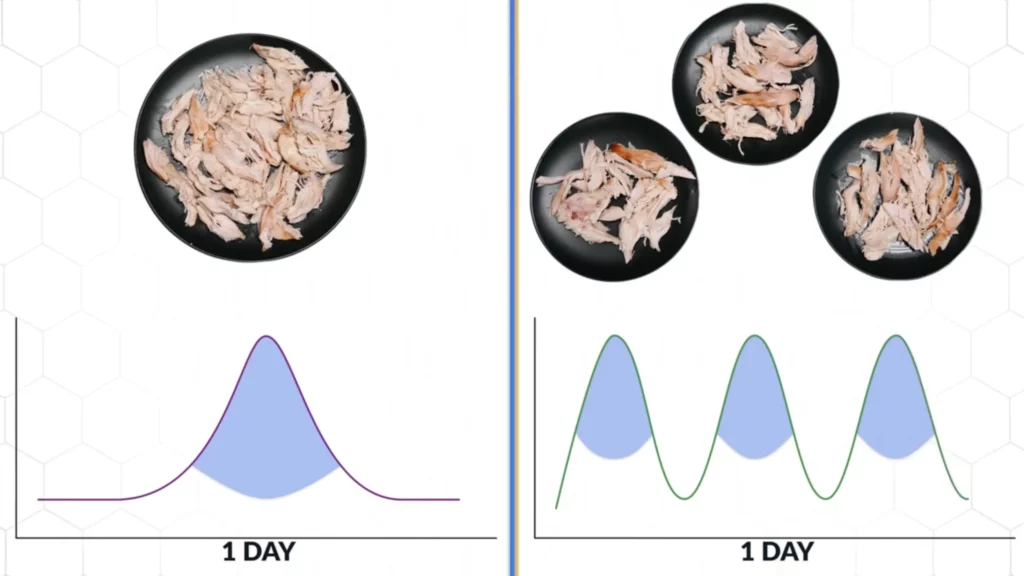
But to determine if this actually makes any difference in muscle growth, let’s take a look at this 2020 study.
Subjects were randomly assigned to 2 groups:
- 1 group had a low-protein breakfast, an average-protein lunch, and a high-protein dinner
- The other group had a more even protein distribution across the 3 meals
Both groups tried to eat a similar amount of total daily protein, but the uneven protein distribution group actually ended up eating about 10 grams more protein per day on average than the even distribution group (97g vs 89g protein per day).
So what happened?
Well, after 12 weeks of this combined with a strength training program, the evenly distributed protein group had slightly more favorable:
- Strength increases for all of the 5 exercises tested (leg curl, leg extension, arm curl, row, chest press), and
- Total lean mass increases (2.5 ± 0.25kg versus 1.8 ± 0.26kg)
That said, the daily protein intakes were quite low for both groups, and the sample size was pretty small for this study, but it does provide some evidence that distributing your protein to at least 3 meals per day may have a benefit.
Psst: need inspiration for high-protein breakfast ideas? See here.
Is There An Upper Limit To The Number Of Protein Meals?
But what about increasing this further to 4, 5, or even 6 protein meals per day? Would that provide an even greater benefit?
Well, a study published a year later helps provide some insight.
Researchers compared the effects of spreading daily protein intake evenly across either 3 or 6 meals per day.
After 8 weeks, there were no significant differences in muscle growth or any other measurement recorded.
So use 3 meals as a minimum, but feel free to eat more than this if it helps make hitting your daily protein target more manageable.
What About Using Protein For Muscle Gain For Older Adults?
Now, pretty much all the research I’ve covered so far on using protein for muscle gain was done with young adults. But as you age, it seems like your body becomes less and less sensitive to protein.
For instance, 1 study found that 20g of protein after a workout was enough to maximize the protein synthesis response in young subjects but not in older individuals.
They instead required 40 grams of protein to get the same response.
This may be one of the reasons why muscle loss becomes more concerning as you age.
So, although yet to be directly studied, it seems that above around 60 years old is when making sure every meal has at least 30-40 grams from a high-quality source may be beneficial for growth.
Takeaway
Ok, we covered a lot.
Here’s a chart that summarizes everything we've covered on using protein for muscle gain and how the recommendations differ based on the individual.
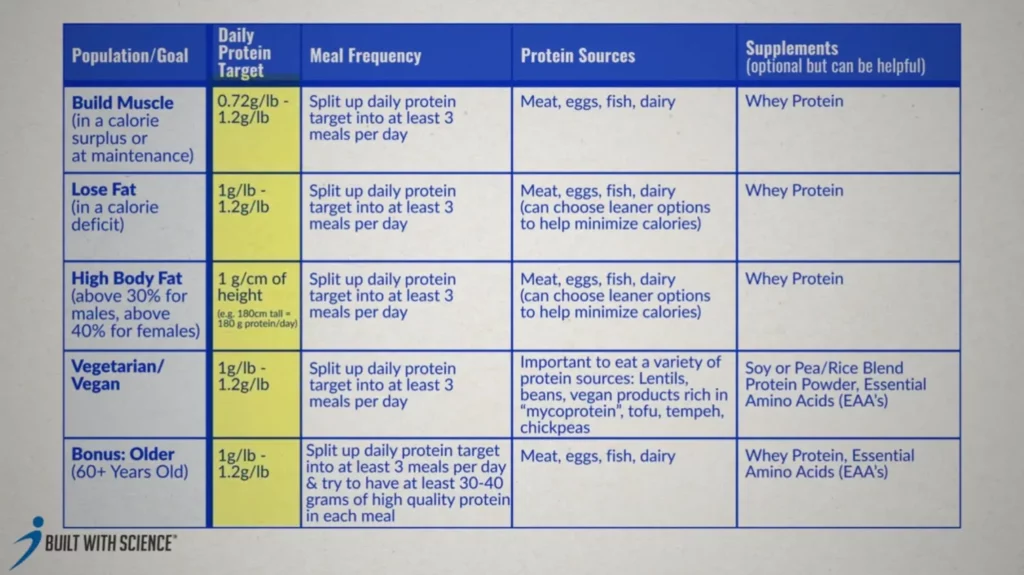
Just always keep in mind that, above all, your daily protein intake is what’s most important.
Now for some more help with your diet, I highly recommend reading this article next for a cheap, high-protein meal plan designed for fat loss or this one for the bulking version.
But if you want a done-for-you science-based plan that’ll guide you every step of the way with both your nutrition and training, just take my quiz to find what program is best for you and your body below:
Click the button below to take my analysis quiz to discover the best program for you:
↓
Thanks for sticking till the end, and I’ll see ya next time!

